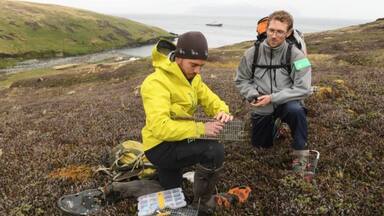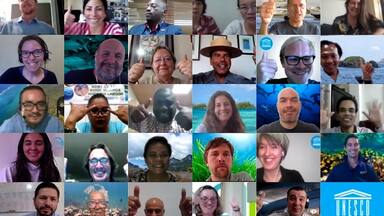Online Meeting: Impacts of the 4th Global Bleaching Event on UNESCO World Heritage-Listed Coral Reefs
The world is currently experiencing its fourth global coral bleaching event, according to National Oceanic and Atmospheric Administration (NOAA) and the International Coral Reef Initiative’s (ICRI) network of coral reef scientists - the second this decade. This mass bleaching event is estimated to have already affected at least 30% of the 29 UNESCO World Heritage-Listed coral reefs.
On 22 May 2024, the UNESCO World Heritage Marine Programme will convene experts from NOAA and ICRI as well as local management teams from the 29 World Heritage-Listed coral reefs to discuss the scope of impact of the current mass bleaching event and share best practices about the most effective ways in securing bleaching preparedness at the local level.
UNESCO’s 2017 assessment, indicating that all World Heritage-designated reefs would undergo mass bleaching events twice per decade by 2040, is now beginning to receive confirmation. The virtual meeting will assist sites in acquiring a better understanding of the most innovative bleaching alert systems and coral bleaching preparedness practices, so that they can rapidly deploy monitoring and evaluation measures during future global mass bleaching events.
Several times per year, UNESCO's World Heritage Marine Programme provides an exclusive online platform where managers from the 50 marine World Heritage sites connect and share practical successes in tackling key conservation challenges.
Due to their status as the world’s flagship marine protected areas, marine World Heritage sites are uniquely positioned to drive change and innovation, set new global standards in conservation excellence, and serve as beacons of hope in a changing ocean. The online meetings are made possible thanks to the support of the French Biodiversity Agency and the Great Barrier Reef Foundation.
Participation is upon invitation only.
Featured Marine World Heritage Site Managers and Experts
Dr. Derek Manzello, Director of NOAA’s Coral Reef Watch
Dr. Derek Manzello is a coral reef ecologist, with a PhD in Marine Biology and Fisheries, and is the Coordinator of NOAA's Coral Reef Watch program, an effort focused on the monitoring of coral reef ecosystems through satellite and in situ observations. Coral Reef Watch uses NOAA satellite data to monitor environmental conditions that lead to coral bleaching and other marine ecological disturbances. Derek has published on multiple topics in coral reef ecology, and he regularly conducts research that spans the disciplines of biology, chemistry, and geology. His primary research interest is understanding the impact of climate change and ocean acidification to coral reef ecosystems.
Ms. Jennifer Koss, Director of NOAA’s Coral Reef Conservation Programme and ICRI Chair
Ms. Jennifer Koss became the director of NOAA’s Coral Reef Conservation Program in 2015, where she created an ambitious vision and strategic plan for coral conservation and management efforts at NOAA. She also holds key national and international positions, serving as the Steering Committee Co-Chair of the U.S. Coral Reef Task Force, Co-Chair of the International Coral Reef Initiative, Chair of the Global Coral Reef Monitoring Network Steering Committee, and Vice-Chair of the Coral Research and Development Accelerator Program (CORDAP). Jennifer is a graduate of NOAA’s Leadership Competencies Development Program and has legislative experience.
Dr. Anna Koester, Aldabra Atoll World Heritage site (Seychelles)
Dr. Anna Koester is a coral reef ecologist who has worked in marine conservation in the Seychelles for the past 8 years. She holds a PhD from the University of Bremen, which focused on the resilience of Aldabra's coral reefs, specifically the impact of and recovery from the 2014-2017 global coral bleaching event. She is currently Aldabra Atoll's Marine Researcher with the Seychelles Islands Foundation and leads the existing marine monitoring activities as well as initiating and implementing new marine research projects.















